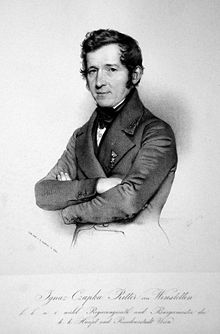Ignaz Czapka

Ignaz Czapka (since 1843 Knights of Winstetten , since 1860 Baron * 24. February 1791 in Liebau , Moravia ; † 5. June 1881 in Vienna ) was an Austrian lawyer, in Vormärz mayor of Vienna and in the time of Absolutism Vienna police director.
Life
Ignaz Czapka studied after his school years in Olomouc at the University of Vienna Jus and entered 1815 as a certified civil and criminal judges (Czeike) at the City of Vienna one.
mayor
Deputy mayor in 1835, he was appointed mayor by Emperor Ferdinand I in 1838 at the suggestion of State Chancellor Metternich . He shone through his specialist knowledge that he had acquired as a civil servant (Czeike).
Czapka took initiatives in the supply sector (in 1839 the market office was founded, in 1846 construction began on municipal slaughterhouses in Sankt Marx and in Gumpendorf ), in 1842 the city administration took over care and had the infrastructure (sewerage, gas lighting, water pipes, etc.) expanded. But he also had to deal with the social tensions created by industrialization , which the government tried to suppress through police violence and censorship .
In 1842 Czapka acquired the manors Jägerzeile and Hundsturm for the city of Vienna , which were incorporated into other suburbs in 1850. In the same year he was awarded the Knight's Cross of the Leopold Order by the Emperor and in 1843 he was raised to the nobility with the title of Winstetten .
Escape and return
When the "Metternich system" ended on March 13, 1848 at the beginning of the March Revolution with Metternich's resignation and flight, Czapka left Vienna on March 16, 1848 , as he could not make up his mind to meet the demands of the population and was retired at his request. In revolutionary Vienna, in the minds of many Viennese , he embodied the civil servants who were only concerned with their own benefit .
In the polemical pamphlet entitled The magistratisch political prey nest or the Vienna magistrate's civil service bureaucracy , which was bought by the Austrian National Library in 2011, Czapka was why the Vienna Greißler Anton Ullmeyer as one of several Erzhalunken referred. He was accused of oppression and exploitation of traders and abuse of office. For illustration, the pamphlet showed Czapka as a robber captain on the gallows.
After the House of Habsburg had exchanged monarchs at the end of the revolutionary year in 1848 , Czapka was able to continue Franz Joseph I's pre-revolutionary career in neo-absolutism . He returned to Vienna in May 1849 and was a local councilor from 1850/1851.
Police Director
In 1856 he was appointed police director of Vienna by the emperor at the suggestion of the military governor of Vienna and the highest police chief of the monarchy, Johann Kempen von Fichtenstamm . (The police were organized militarily at the time.) When Kempen retired in 1859, Czapka also retired that same year.
On February 28, 1860, the Kaiser awarded him the Order of the Iron Crown, 2nd class; Czapka exercised his associated right to apply for elevation to the baron class. 1861–1863 Czapka was once again elected councilor.
Commemoration
In Vienna , three months after Czapka's death in 1881, Czapkagasse in the 3rd district was named. 110 years later, in 1991, a park at Czapkagasse 17 between the houses was named Czapkapark.
He rests in the Hietzingen cemetery in an honorary grave (group 13, number 7).
The year of birth of Czapka is usually given as 1792.
literature
- Constantin von Wurzbach : Czapka Ritter von Winstetten, Ignaz . In: Biographisches Lexikon des Kaiserthums Oesterreich . 3rd part. Typogr.-literar.-artist publishing house. Establishment (L. C. Zamarski, C. Dittmarsch & Comp.), Vienna 1858, pp. 83-85 ( digitized version ).
- Czapka from Winstetten Ignaz. In: Austrian Biographical Lexicon 1815–1950 (ÖBL). Volume 1, Verlag der Österreichischen Akademie der Wissenschaften, Vienna 1957, p. 160.
- Felix Czeike : Historical Lexicon Vienna. Volume 1: A – Da. Kremayr & Scheriau, Vienna 1992, ISBN 3-218-00543-4 , p. 601.
Web links
- Entry on Ignaz Czapka in the Austria Forum (in the AEIOU Austria Lexicon )
Individual evidence
- ↑ Czeike (see literature ) in accordance with Wiener Abendpost , supplement to Wiener Zeitung , No. 128, June 7, 1881, p. 3
- ^ Polemical pamphlet from 1848 , note in the newsletter Austrian National Library , Vienna, No. 4, November 2011, p. 7
| personal data | |
|---|---|
| SURNAME | Czapka, Ignaz |
| BRIEF DESCRIPTION | Austrian politician and lawyer |
| DATE OF BIRTH | February 24, 1791 |
| PLACE OF BIRTH | Liebau |
| DATE OF DEATH | June 5, 1881 |
| Place of death | Vienna |

